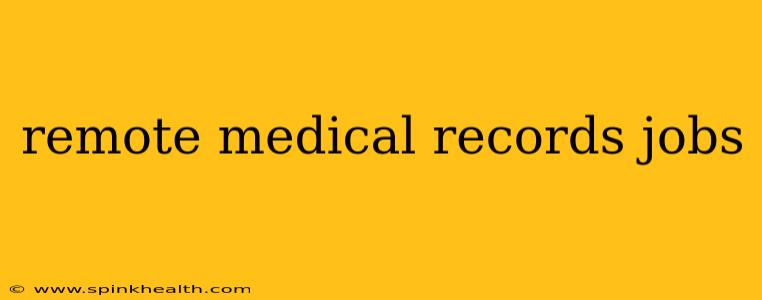The hum of the computer, the gentle click of the keyboard – that's the soundtrack of many modern careers, and increasingly, it's the soundtrack of medical records jobs. But forget the sterile, clinical setting of years past. Today, a vast landscape of remote medical records jobs is flourishing, offering flexible work arrangements and in-demand skills. This isn't just a trend; it's a revolution in healthcare administration, fueled by technology and a growing need for efficient, accessible medical data management. Let's delve into this exciting field.
My name is Sarah Chen, and I've spent over a decade navigating the intricacies of the healthcare IT sector. I've seen firsthand the transformation of medical record keeping, and the rise of remote opportunities is particularly compelling. I'm here to share my insights and guide you through the possibilities.
What are the Different Types of Remote Medical Records Jobs?
The beauty of remote medical records work is its diversity. It's not a one-size-fits-all scenario. You'll find a plethora of roles catering to varying skill sets and experience levels.
-
Medical Records Technician: These professionals are the backbone of medical record organization. Their responsibilities include data entry, chart preparation, coding, and ensuring the accuracy and integrity of patient information. Many of these positions are now successfully handled remotely.
-
Medical Coder: Medical coders translate medical diagnoses, procedures, and services into standardized alphanumeric codes using systems like ICD-10 and CPT. This crucial role ensures accurate billing and data analysis, often performed remotely with secure access to electronic health records (EHR).
-
Health Information Manager: These professionals oversee the entire medical records process, ensuring compliance with regulations, managing staff (sometimes remotely!), and implementing efficient workflows. Many aspects of this managerial role can be effectively executed remotely.
-
Transcriptionist: While not strictly "medical records," medical transcriptionists play a vital role in converting audio recordings of physician dictations into written reports. This is a naturally remote-friendly career, and the demand continues to be high.
What Skills Do You Need for Remote Medical Records Jobs?
The key to success in this field lies in possessing a blend of technical and soft skills. Let's explore what employers look for:
-
Proficiency in EHR Software: Experience with common EHR systems (Epic, Cerner, Allscripts) is highly valuable. Remote workers need to be comfortable navigating these digital environments efficiently and securely.
-
Medical Terminology and Coding Knowledge: A solid understanding of medical terminology, ICD-10, CPT, and HCPCS coding is essential for most roles. This allows for accurate data entry and processing.
-
Data Entry Skills: Accuracy and speed are paramount when dealing with sensitive patient information. Employers often assess these skills through typing tests.
-
Attention to Detail: Medical records require meticulous accuracy. A single error can have serious consequences.
-
Strong Organizational Skills: Managing multiple files, deadlines, and tasks requires excellent organizational skills, especially when working remotely and independently.
-
Technical Proficiency: Remote work necessitates strong computer skills, reliable internet access, and familiarity with relevant software and hardware.
How Much Do Remote Medical Records Jobs Pay?
Salaries for remote medical records jobs vary based on experience, location, and specific role. However, in general, you can expect competitive compensation, often comparable to on-site positions. Entry-level positions may start lower, but experienced professionals can command significantly higher salaries.
What are the Challenges of Working Remotely in Medical Records?
While remote work offers many advantages, it's essential to acknowledge the challenges:
-
Maintaining Confidentiality and Security: Protecting patient data is paramount. Remote workers must adhere to strict HIPAA compliance guidelines and utilize secure systems to prevent breaches.
-
Isolation and Communication: Working remotely can lead to feelings of isolation. Effective communication with colleagues and supervisors is crucial.
-
Technology Issues: Reliable internet access and equipment are crucial. Technical glitches can significantly impact productivity.
Where Can I Find Remote Medical Records Jobs?
Many job boards, company websites, and recruitment agencies specialize in healthcare IT roles. Utilize keywords like "remote medical records," "telehealth," "virtual medical records," and "remote HIM" in your job searches.
This rapidly growing field offers an enticing mix of flexibility and professional fulfillment. With the right skills and dedication, a rewarding career in remote medical records is within reach. Remember to prioritize continuous learning, stay updated on industry trends, and build a strong professional network. The future of healthcare is increasingly digital, and you can be a part of it.

